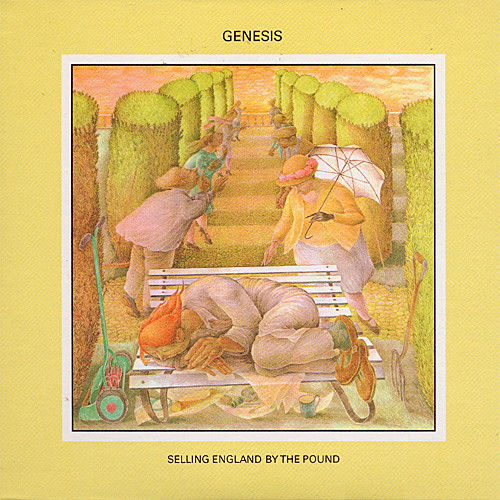
Selling England By The Pound (1973)

1.Dancing With the Moonlit Knight
2.I Know What I Like
(In Your Wardrobe)
3.Firth of Fifth
4.More Fool Me
5.The Battle of Epping Forest
6.After the Ordeal
7.The Cinema Show/Aisle of Plenty
If the term “Old Genesis” has any real meaning, it generally points toward the Peter Gabriel years—a convenient shorthand, though arguably a crude one. For those inclined to listen with discernment, the six studio albums Genesis produced between 1970 and 1975 are anything but homogeneous. There is a clear line of artistic development running through them: a trajectory from fledgling ideas to formidable execution. Selling England by the Pound represents a pronounced leap forward, both musically and in terms of studio sophistication.
Previous records—Nursery Cryme and Foxtrot—had already revealed a band of considerable ambition, yet there were moments of unevenness, perhaps the result of youthful overreach or merely the constraints of early '70s British production budgets. By contrast, this 1973 offering is positively luxuriant. The recording is pristine, the arrangements confident, and the performances, for once, entirely in step with the band’s lofty aspirations.
The opening track, Dancing with the Moonlit Knight, sets the tone in no uncertain terms. A haunting a cappella from Gabriel leads into a slow accumulation of instrumental colour—those familiar duelling 12-strings, Banks’s omnipresent wash of keyboards—until the piece resolves into a thundering display of symphonic rock. There’s a classical sensibility at work here, not merely in structure but in mood. Indeed, with its shapely development and elegiac fadeout, one could imagine the piece transcribed for chamber orchestra without loss.
This refinement extends throughout. Firth of Fifth, long regarded as the album’s centrepiece, is little short of a revelation. Tony Banks, once merely serviceable, emerges here as a player of considerable authority, his piano introduction now rightfully considered a touchstone of progressive rock keyboard work. Steve Hackett’s contribution—an aching, lyrical guitar solo—is no less accomplished. Banks also dominates The Cinema Show, an extended meditation that benefits from its slowly unfolding textures and understated rhythmic propulsion. At over eleven minutes, it threatens excess but never succumbs to it; length, for once, is earned.
The album’s brief flirtation with accessibility comes via I Know What I Like (In Your Wardrobe), a modest chart entry in the UK and the first real indication that Genesis might, in time, cross over to more mainstream acclaim. The song’s pop leanings are faint—just enough to suggest commercial instinct without abandoning the group’s characteristic aloofness. It remains a charming, if slightly mannered, oddity in their catalogue and would later be reimagined (with some success) during the band’s Phil Collins-led era.
Collins himself makes a significant vocal appearance here on More Fool Me, a delicate acoustic ballad that offers a welcome moment of simplicity amidst the complexity. His voice, not yet seasoned, is tentative but affecting—a foreshadowing of things to come rather than a centerpiece in its own right.
That said, not everything on Selling England escapes criticism. The Battle of Epping Forest, in particular, overstays its welcome-although just a bit. It's a slightly cluttered narrative sprawled across a convoluted arrangement, it sounds a tad too pleased with itself. The band, clearly aiming for a kind of Cockney epic, instead veer into the theatrical absurd. Admirers defend it vigorously; others (perhaps more sensibly) suggest a red pencil might have done wonders.
Still, the album remains a high-water mark. That the band chose to revisit substantial portions of it during their 2007 reunion tour is telling. These were not perfunctory nods to nostalgia but affirmations of work they considered enduring. Selling England by the Pound marked the point at which Genesis ceased to be clever schoolboys with a penchant for costumes and became serious contenders in the progressive pantheon. It is, in every sense, the sound of a band arriving.
Go back to the main page
Go To Next Review